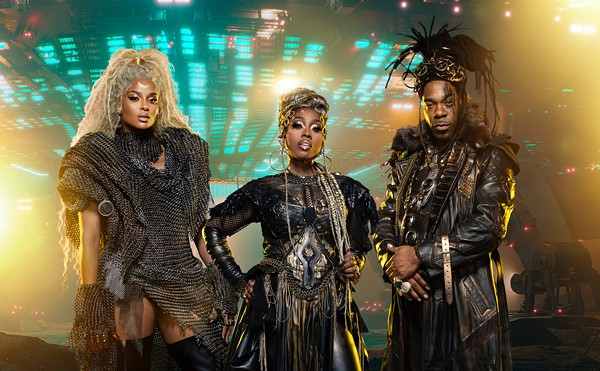The pair had never been in a 24-track studio before, but that didn't stop them. "We were like kids in a candy shop with all that equipment," remembers More, "but we still did it all on turntables."
The resulting track, it can be argued, was the first true crossover hip-hop hit in hipsterville; the six minute-plus Coldcut remix of "Paid in Full" set itself above the din with its "This is a journey into sound" intro, Ofra Haza sample, and a B-side anchored by the guitar riff from John (then-) Cougar's "Jack & Diane."
By pulling back hip-hop's Oz-curtain of boasting and toasting to reveal the ropes, pulleys and switches of hip-hop's music, Coldcut made the case that hip-hop's music could make as much of an impact as its message. The world listened and trip hop, the loose term to describe instrumental hip hop, was born.
Getting into the genre more for its William Burroughs cut-up sensibilities than its South Bronx bravado, More dismisses most current hip hop. "I can't listen to a whole record of it; the lyrical stuff never made much sense to us over here anyway, which is where trip hop came from," he says. "Hip hop now is really formulaic, cartoony, and it makes a lot of money."
In its artful way, Coldcut has never been, to quote Puffy, "about the Benjamins." Which is why a decade after remixing "Paid in Full," Coldcut is still two kids in a candy shop. The difference, though, is that they now own the store -- albeit a modest one. After a few brushes with major labels following "Paid in Full," the pair founded their own superb label, Ninja Tune, which has serviced the world with some of the most potent instrumental hip hop ever heard.
Coldcut's latest offering on Ninja Tune, a CD/CD-ROM pairing called Let Us Play, is a high-tech primordial ooze of beats, sample collaging, digital free-jazz and wide-eyed interactivity. Guest mixes and appearances by San Francisco turntablists Invisible Skratch Pickles, post-rock pioneer John McEntire of Chicago's Tortoise and perennial agit-punker Jello Biafra prove that if the Coldcut duo are trip-hop's Mad Professors, they've got one helluva guest lecturer series.
As for their upcoming show at Pontiac's Industry headlining the Ninja Tune label tour, More and Black plan to school the audience in chaos theory. The pair worked with programmers to design their own software to open up and break down the layered samples and slipstream logic of Let Us Play to infinite reinterpretation live. "It's like deejaying; a lot of the skill is choosing the elements and then randomizing them, letting them play and seeing what happens."
Live, the pair uses laptops and turntables to recut and refigure their sounds. But More, like cyberpunk author William Gibson, is concerned with technology not as an end in itself but to see where it will end up in everyday life. Or, in Coldcut's case, every night's show.
So, while Britain seems overrun with late '80s popsters now making dance records (Fatboy Slim, Bentley Rhythm Ace), Coldcut has stayed relevant not by trying to sound current, but by being current. As such, for all the tech-talk, Coldcut's attitude is more post-technology than anything else.
"We get e-mails from people wondering why we don't do certain songs live, when the truth is we won't be able to until we get bigger computers," More sighs.
"I'll be happy when we won't have to set up all these computers and programs to play live, when we can just show up with a couple of boxes and do our shit."
Two turntables and a microphone? "More like two DVDs, but yeah." Hobey Echlin is a freelance writer. Send comments to [email protected]





